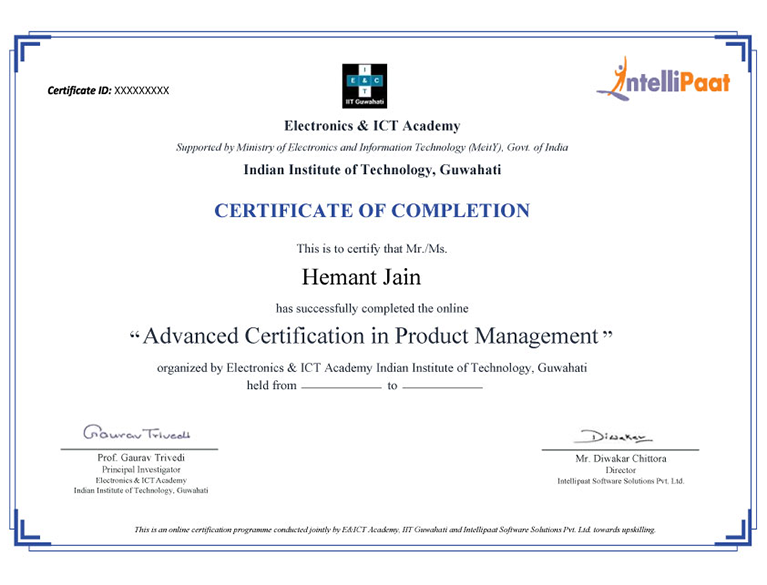Your cart is currently empty.







Watch
Course PreviewLearning Format
Online Bootcamp
Live Classes
6 Months
Campus Immersion
IIT Guwahati
EICT IIT Guwahati
Certification
EMI Starts
at ₹8,000/month*
This course, in collaboration with EICT IIT Guwahati, will help you become part of the next generation of product management professionals. It covers topics like product lifecycle, product vision, strategy, research, and more.
About E&ICT, IIT Guwahati
This advanced certification program is in partnership with E&ICT Academy, IIT Guwahati. E&ICT, IIT Guwahati is an initiative of the Ministry of Electronics and Information Technology (MeitY), Govt. of India, and formed with the team of IIT Guwahati professors to provide high-quality education programs.
Achievements of IIT Guwahati
Upon the completion of this program, you will receive:
55% Average Salary Hike
45 LPA Highest Salary
12000+ Career Transitions
300+ Hiring Partners
Career Transition Handbook
*Past record is no guarantee of future job prospects
Product owners are a part of the agile product management team that consists of both a product manager and a product owner. A product owner supports the development team in solving the issues specific to the product.
Growth product managers work on a group of products and are involved in research, strategy, development, and people management—all aiming at driving the future growth of the products.
Technical product managers have a strong technical background and are responsible for managing the end-to-end routine activities of product management. They work mainly with the engineering team.
Product managers are responsible for overseeing the individual sections in the product management process, such as development, design, etc. They do not need to have a strong technical background as technical product manager.
Chief product officers (CPOs) drive the entire product team—starting from the development team to product managers and design to execution.
Product engineers design the products and also manage the manufacturing process for them. They coordinate with the product development team and take care of the design strategy.
Skills to Master
Product Design
Product Planning
Market Research and Strategy
Data Cleaning
Data Analytics
Stakeholder Management
Prototyping
Product Experimentation
Artificial Intelligence
Machine Learning
Usability Testing
Agile Development
Pricing Strategy
User Retention
Tools to Master
Managing Product Development Methodology
Microsoft Excel
Project Management Tools – JIRA Software for Beginners
Dashboards
UML 2.0
Dashboards
Product Launch Strategies
Sustaining and Managing Product Lifecycle
Post-Launch Review and Continuous Improvement
Projects will be a part of your Executive Professional Certification Program in Product Management to solidify your learning. They ensure you have real-world experience in Product Management.
Practice 20+ Essential Tools
Designed by Industry Experts
Get Real-world Experience

Admission Details
The application process consists of three simple steps. An offer of admission will be made to selected candidates based on the feedback from the interview panel. The selected candidates will be notified over email and phone, and they can block their seats through the payment of the admission fee.
Submit Application
Tell us a bit about yourself and why you want to join this program
Application Review
An admission panel will shortlist candidates based on their application
Admission
Selected candidates will be notified within 1–2 weeks
Total Admission Fee
EMI Starts at
We partnered with financing companies to provide very competitive finance options at 0% interest rate
Financing Partners
![]()
This Advanced Certification in Product Management course has been designed by top experts in the field with a deep understanding of industry requirements. The course covers various projects and assignments that will assist you in becoming job-ready and taking on challenging roles within the product management industry.
This Advanced Certification in Product Management course offers numerous benefits. It provides in-depth knowledge of product management principles, strategies, and best practices through a comprehensive curriculum. Additionally, the course offers practical hands-on experience through real-world projects, industry insights from expert instructors, and valuable networking opportunities with fellow learners. By enrolling in this course, you can gain the skills and confidence needed to excel in the dynamic field of product management.
Advanced Certification in Product Management offers a wide range of job opportunities, including product manager, product owner, product marketing manager, and strategic product planner. These roles exist in various industries and companies of all sizes. With the increasing demand for skilled product managers, the field provides promising career prospects and growth potential. There are 25,000+ job opportunities for professionals in India alone and over 260,000 job opportunities in the USA.
Upon completing this Advanced Certification in Product Management, you unlock a wide range of career opportunities. As a certified product manager, you can pursue roles such as product manager, product strategist, product marketing manager, or even start your own product-oriented ventures. The scope extends across various industries, including technology, e-commerce, healthcare, finance, and more. You will be equipped to lead product development, drive innovation, and contribute to the success and growth of organizations.
The average salary for professionals in product management roles varies based on experience and industry. Generally, entry-level positions start from ₹6,00,000 per annum, while mid-level positions can range from ₹10,00,000 to ₹18,00,000 per annum. Senior roles, such as Senior Product Manager or Head of Product, can command salaries upwards of ₹25,00,000 per annum.
The course covers a wide range of topics, including the product life cycle, growth product management, product vision, strategy, and research, market research, pricing strategies, agile methodologies, user experience design, data analytics, and more. It also includes hands-on projects and case studies to provide practical experience.
The course is taught by experienced IIT faculty and industry experts with extensive experience in product management. Practitioners from leading companies also provide insights into real-world challenges and best practices.
Intellipaat is renowned for its high-quality product management training courses and industry mentorship. Our alumni have successfully secured positions in esteemed global organizations such as Amazon, Microsoft, Genpact, Sony, Gartner, and more. Additionally, learners gain lifetime access to free upgrades and course materials, providing ongoing support throughout their careers. By enrolling in Advanced Certification in Product Management course, you can take advantage of exclusive career guidance, interview preparation, and other valuable benefits.
Upon successful completion, you will receive an Advanced Certification in Product Management from EICT IIT Guwahati, which is recognized and valued in the industry.
The course is structured into various modules, each focusing on different aspects of product management. It is designed to be completed in 6 months, with a mix of online lectures, interactive workshops, and practical projects.
Intellipaat is offering 24/7 query resolution, and you can raise a ticket with the dedicated support team at any time. You can avail of email support for all your queries. If your query does not get resolved through email, we can also arrange one-on-one sessions with our support team. However, 1:1 session support is provided for a period of 6 months from the start date of your course.
Intellipaat is offering you the most updated, relevant, and high-value real-world projects as part of the training program. This way, you can implement the learning that you have acquired in a real-world industry setup. All training comes with multiple projects that thoroughly test your skills, learning, and practical knowledge, making you completely industry-ready.
Intellipaat actively provides placement assistance to all learners who have successfully completed the training. Intellipaat certification is recognized by over 3100 hiring companies around the world. This way, you can be placed in outstanding organizations such as Sony, Ericsson, TCS, Mu Sigma, Standard Chartered, Cognizant, and Cisco, among other equally great enterprises. We also help you with the job interview and résumé preparation as well.
Yes, Advanced Certification in Product Management is highly valuable. It not only validates your expertise and knowledge in product management but also enhances your credibility in the job market. It demonstrates your commitment to professional growth and can significantly increase your chances of securing rewarding career opportunities in the field.
This Advanced Certification in Product Management course introduces a range of industry-standard tools and platforms used in product management. These may include market research tools like surveys and customer feedback platforms, as well as data analytics software for analyzing product performance and user behavior, project management tools for organizing and tracking tasks, and collaboration platforms for seamless team communication and coordination.
What is included in this course?
 Click to Zoom
Click to Zoom


















